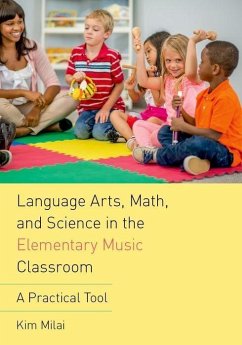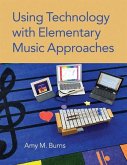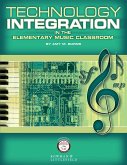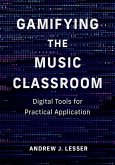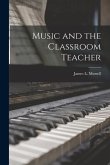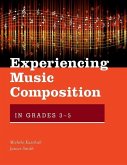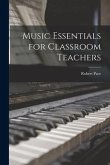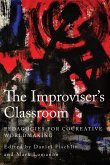- Broschiertes Buch
- Merkliste
- Auf die Merkliste
- Bewerten Bewerten
- Teilen
- Produkt teilen
- Produkterinnerung
- Produkterinnerung
Language Arts, Math, and Science in the Elementary Music Classroom provides a practical guide to help music teachers incorporate elementary classroom subjects into their curriculum using STEAM (Science, Technology, Engineering, Arts and Math)-inspired strategies, with added emphasis on social studies.
Andere Kunden interessierten sich auch für
![Using Technology with Elementary Music Approaches Using Technology with Elementary Music Approaches]() Amy M BurnsUsing Technology with Elementary Music Approaches52,99 €
Amy M BurnsUsing Technology with Elementary Music Approaches52,99 €![Technology Integration in the Elementary Music Classroom Technology Integration in the Elementary Music Classroom]() Amy M. BurnsTechnology Integration in the Elementary Music Classroom33,99 €
Amy M. BurnsTechnology Integration in the Elementary Music Classroom33,99 €![Gamifying the Music Classroom Gamifying the Music Classroom]() Andrew J LesserGamifying the Music Classroom35,99 €
Andrew J LesserGamifying the Music Classroom35,99 €![Music and the Classroom Teacher Music and the Classroom Teacher]() Music and the Classroom Teacher26,99 €
Music and the Classroom Teacher26,99 €![Experiencing Music Composition in Grades 3-5 Experiencing Music Composition in Grades 3-5]() Michele KaschubExperiencing Music Composition in Grades 3-544,99 €
Michele KaschubExperiencing Music Composition in Grades 3-544,99 €![Music Essentials for Classroom Teachers Music Essentials for Classroom Teachers]() Robert PaceMusic Essentials for Classroom Teachers20,99 €
Robert PaceMusic Essentials for Classroom Teachers20,99 €![The Improviser's Classroom The Improviser's Classroom]() The Improviser's Classroom51,99 €
The Improviser's Classroom51,99 €-
-
-
Language Arts, Math, and Science in the Elementary Music Classroom provides a practical guide to help music teachers incorporate elementary classroom subjects into their curriculum using STEAM (Science, Technology, Engineering, Arts and Math)-inspired strategies, with added emphasis on social studies.
Hinweis: Dieser Artikel kann nur an eine deutsche Lieferadresse ausgeliefert werden.
Hinweis: Dieser Artikel kann nur an eine deutsche Lieferadresse ausgeliefert werden.
Produktdetails
- Produktdetails
- Verlag: Oxford University Press
- Seitenzahl: 352
- Erscheinungstermin: 1. September 2017
- Englisch
- Abmessung: 254mm x 175mm x 23mm
- Gewicht: 612g
- ISBN-13: 9780190661885
- ISBN-10: 0190661887
- Artikelnr.: 47867195
- Herstellerkennzeichnung
- Libri GmbH
- Europaallee 1
- 36244 Bad Hersfeld
- gpsr@libri.de
- Verlag: Oxford University Press
- Seitenzahl: 352
- Erscheinungstermin: 1. September 2017
- Englisch
- Abmessung: 254mm x 175mm x 23mm
- Gewicht: 612g
- ISBN-13: 9780190661885
- ISBN-10: 0190661887
- Artikelnr.: 47867195
- Herstellerkennzeichnung
- Libri GmbH
- Europaallee 1
- 36244 Bad Hersfeld
- gpsr@libri.de
Kim Milai has worked as an elementary music teacher in public and private schools for the past twenty-five years. As well as being a NYC rock drummer in bands that opened for groups like the B52's, Cindy Lauper and Living Colour, she produced and performed in her own children's music CD, Dinobone, Dinobone, Have You Heard?. She has Kodály training along with certification in Suzuki flute 1A and 1B. Kim earned a Masters in Music Education at the Eastman School of Music and currently lives with her husband and two children at the foothills of the Blue Ridge Mountains of Virginia.
* Dedication
* Acknowledgements
* Part One: Introduction
* The Elementary Class: Transitioning to the Future
* Using the National Core Arts Music Standards as a Tool
* Subject Integration
* What is STEM and NGSS?
* A Word About STEAM
* What This Practical Guide Includes
* Rationale: How is the Music Class Evolving?
* My Philosophy of Music Education: The Body/Brain Connection
* Teaching Examples
* Pedagogy
* Why should we be open to adding other subjects within the music
lesson?
* To Discuss or Complete
* Part Two: Lesson Plans
* Lesson Overview
* How to Get Started: The Process in Metaphor
* Leaving the Metaphor
* National Core Arts Music Standards
* Tips on Creating Questions
* Lesson Building Blocks
* Include Popular Music
* Composition and Improvisation: Where Do They Fit Into the New
Standards?
* Integrating Basic Subjects with the Music Curriculum
* The Class
* To Discuss or Complete
* Keys
* Kindergarten
* September 1-4
* October 5-8
* November 9-12
* December 13-16
* January 17-20
* February 21-24
* March 25-28
* April 29-32
* May 33-36
* Kindergarten Resources
* KINDERGARTEN GROUP MUSIC ASSESSMENT TEST
* KINDERGARTEN CONCEPT CODE MATRIX
* Kindergarten Song List
* First Grade
* September 1-4
* October 5-8
* November 9-12
* December 13-16
* January 17-20
* February 21-24
* March 25-28
* April 29-32
* May 33-36
* FIRST GRADE GROUP MUSIC ASSESSMENT TEST
* FIRST GRADE CONCEPT CODE MATRIX
* First Grade Song List
* Second Grade
* September 1-4
* October 5-8
* November 9-12
* December 13-16
* January 17-20
* February 21-24
* March 25-28
* April 29-32
* May 33-36
* SECOND GRADE GROUP MUSIC ASSESSMENT TEST
* SECOND GRADE CONCEPT CODE MATRIX
* Second Grade Song List
* Acoustics: Definitions
* Acoustics: Decibels
* Composer Unit
* Turn the Glasses Over
* Part Three: Songs
* Song List
* Part Four: Coded Concepts
* Overview
* Music
* Math
* Language Arts
* Science
* Social Studies
* Part Five: Appendix
* American and World Culture Month to Month
* Assembly and Concert Suggestions
* Bibliography
* Classical and Folk Listening Lists
* Copyright Information
* Lesson Template
* Group Exploration: Descriptive Music Words
* National Recess Week
* Online Support
* Music Notation Printouts
* Storybooks and Picture Books
* Indexes
* Acknowledgements
* Part One: Introduction
* The Elementary Class: Transitioning to the Future
* Using the National Core Arts Music Standards as a Tool
* Subject Integration
* What is STEM and NGSS?
* A Word About STEAM
* What This Practical Guide Includes
* Rationale: How is the Music Class Evolving?
* My Philosophy of Music Education: The Body/Brain Connection
* Teaching Examples
* Pedagogy
* Why should we be open to adding other subjects within the music
lesson?
* To Discuss or Complete
* Part Two: Lesson Plans
* Lesson Overview
* How to Get Started: The Process in Metaphor
* Leaving the Metaphor
* National Core Arts Music Standards
* Tips on Creating Questions
* Lesson Building Blocks
* Include Popular Music
* Composition and Improvisation: Where Do They Fit Into the New
Standards?
* Integrating Basic Subjects with the Music Curriculum
* The Class
* To Discuss or Complete
* Keys
* Kindergarten
* September 1-4
* October 5-8
* November 9-12
* December 13-16
* January 17-20
* February 21-24
* March 25-28
* April 29-32
* May 33-36
* Kindergarten Resources
* KINDERGARTEN GROUP MUSIC ASSESSMENT TEST
* KINDERGARTEN CONCEPT CODE MATRIX
* Kindergarten Song List
* First Grade
* September 1-4
* October 5-8
* November 9-12
* December 13-16
* January 17-20
* February 21-24
* March 25-28
* April 29-32
* May 33-36
* FIRST GRADE GROUP MUSIC ASSESSMENT TEST
* FIRST GRADE CONCEPT CODE MATRIX
* First Grade Song List
* Second Grade
* September 1-4
* October 5-8
* November 9-12
* December 13-16
* January 17-20
* February 21-24
* March 25-28
* April 29-32
* May 33-36
* SECOND GRADE GROUP MUSIC ASSESSMENT TEST
* SECOND GRADE CONCEPT CODE MATRIX
* Second Grade Song List
* Acoustics: Definitions
* Acoustics: Decibels
* Composer Unit
* Turn the Glasses Over
* Part Three: Songs
* Song List
* Part Four: Coded Concepts
* Overview
* Music
* Math
* Language Arts
* Science
* Social Studies
* Part Five: Appendix
* American and World Culture Month to Month
* Assembly and Concert Suggestions
* Bibliography
* Classical and Folk Listening Lists
* Copyright Information
* Lesson Template
* Group Exploration: Descriptive Music Words
* National Recess Week
* Online Support
* Music Notation Printouts
* Storybooks and Picture Books
* Indexes
* Dedication
* Acknowledgements
* Part One: Introduction
* The Elementary Class: Transitioning to the Future
* Using the National Core Arts Music Standards as a Tool
* Subject Integration
* What is STEM and NGSS?
* A Word About STEAM
* What This Practical Guide Includes
* Rationale: How is the Music Class Evolving?
* My Philosophy of Music Education: The Body/Brain Connection
* Teaching Examples
* Pedagogy
* Why should we be open to adding other subjects within the music
lesson?
* To Discuss or Complete
* Part Two: Lesson Plans
* Lesson Overview
* How to Get Started: The Process in Metaphor
* Leaving the Metaphor
* National Core Arts Music Standards
* Tips on Creating Questions
* Lesson Building Blocks
* Include Popular Music
* Composition and Improvisation: Where Do They Fit Into the New
Standards?
* Integrating Basic Subjects with the Music Curriculum
* The Class
* To Discuss or Complete
* Keys
* Kindergarten
* September 1-4
* October 5-8
* November 9-12
* December 13-16
* January 17-20
* February 21-24
* March 25-28
* April 29-32
* May 33-36
* Kindergarten Resources
* KINDERGARTEN GROUP MUSIC ASSESSMENT TEST
* KINDERGARTEN CONCEPT CODE MATRIX
* Kindergarten Song List
* First Grade
* September 1-4
* October 5-8
* November 9-12
* December 13-16
* January 17-20
* February 21-24
* March 25-28
* April 29-32
* May 33-36
* FIRST GRADE GROUP MUSIC ASSESSMENT TEST
* FIRST GRADE CONCEPT CODE MATRIX
* First Grade Song List
* Second Grade
* September 1-4
* October 5-8
* November 9-12
* December 13-16
* January 17-20
* February 21-24
* March 25-28
* April 29-32
* May 33-36
* SECOND GRADE GROUP MUSIC ASSESSMENT TEST
* SECOND GRADE CONCEPT CODE MATRIX
* Second Grade Song List
* Acoustics: Definitions
* Acoustics: Decibels
* Composer Unit
* Turn the Glasses Over
* Part Three: Songs
* Song List
* Part Four: Coded Concepts
* Overview
* Music
* Math
* Language Arts
* Science
* Social Studies
* Part Five: Appendix
* American and World Culture Month to Month
* Assembly and Concert Suggestions
* Bibliography
* Classical and Folk Listening Lists
* Copyright Information
* Lesson Template
* Group Exploration: Descriptive Music Words
* National Recess Week
* Online Support
* Music Notation Printouts
* Storybooks and Picture Books
* Indexes
* Acknowledgements
* Part One: Introduction
* The Elementary Class: Transitioning to the Future
* Using the National Core Arts Music Standards as a Tool
* Subject Integration
* What is STEM and NGSS?
* A Word About STEAM
* What This Practical Guide Includes
* Rationale: How is the Music Class Evolving?
* My Philosophy of Music Education: The Body/Brain Connection
* Teaching Examples
* Pedagogy
* Why should we be open to adding other subjects within the music
lesson?
* To Discuss or Complete
* Part Two: Lesson Plans
* Lesson Overview
* How to Get Started: The Process in Metaphor
* Leaving the Metaphor
* National Core Arts Music Standards
* Tips on Creating Questions
* Lesson Building Blocks
* Include Popular Music
* Composition and Improvisation: Where Do They Fit Into the New
Standards?
* Integrating Basic Subjects with the Music Curriculum
* The Class
* To Discuss or Complete
* Keys
* Kindergarten
* September 1-4
* October 5-8
* November 9-12
* December 13-16
* January 17-20
* February 21-24
* March 25-28
* April 29-32
* May 33-36
* Kindergarten Resources
* KINDERGARTEN GROUP MUSIC ASSESSMENT TEST
* KINDERGARTEN CONCEPT CODE MATRIX
* Kindergarten Song List
* First Grade
* September 1-4
* October 5-8
* November 9-12
* December 13-16
* January 17-20
* February 21-24
* March 25-28
* April 29-32
* May 33-36
* FIRST GRADE GROUP MUSIC ASSESSMENT TEST
* FIRST GRADE CONCEPT CODE MATRIX
* First Grade Song List
* Second Grade
* September 1-4
* October 5-8
* November 9-12
* December 13-16
* January 17-20
* February 21-24
* March 25-28
* April 29-32
* May 33-36
* SECOND GRADE GROUP MUSIC ASSESSMENT TEST
* SECOND GRADE CONCEPT CODE MATRIX
* Second Grade Song List
* Acoustics: Definitions
* Acoustics: Decibels
* Composer Unit
* Turn the Glasses Over
* Part Three: Songs
* Song List
* Part Four: Coded Concepts
* Overview
* Music
* Math
* Language Arts
* Science
* Social Studies
* Part Five: Appendix
* American and World Culture Month to Month
* Assembly and Concert Suggestions
* Bibliography
* Classical and Folk Listening Lists
* Copyright Information
* Lesson Template
* Group Exploration: Descriptive Music Words
* National Recess Week
* Online Support
* Music Notation Printouts
* Storybooks and Picture Books
* Indexes

